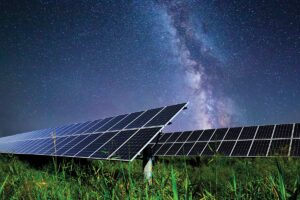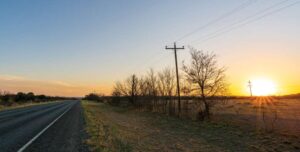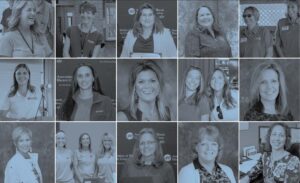Let’s be upfront about the fact that there are a lot of challenges in the energy industry, challenges in the economy, and challenges in our politics. They all intersect in your community, at your electric cooperative.
My focus is on helping co-ops be more effective, connecting you to resources, and telling the story about the leadership you provide. That’s how we continue to succeed in a complex, changing, and exciting world with a cooperative business model that works.
It’s how co-ops keep the lights on. It’s how you keep the lights on. It’s a goal we share, because when I think about how co-ops keep the lights on it’s not just about service to your members at the end of the line. It’s not just about electricity.
It’s about the co-op part of keeping the lights on. It’s about a stable, trusted, member-owned, community-based, responsive electric cooperative that people count on to do its job well and to keep doing it, long into the future.
Written into that objective are seven cooperative principles: open membership, strong governance, autonomy and independence, local control, member participation, cooperation, and community. These principles are the foundation of every electric cooperative.
‘Electric’ is our business, but ‘cooperative’ is our identity. It’s who we are, and how we do this important job for our community. That word, ‘cooperative,’ sets a standard, and it sets an expectation. We live these principles in our co-ops. They’re a powerful guide for the work we do. They matter in the conversations we have about how we serve electricity – but more important – how we serve others.
Being cooperatives makes us instantly accountable. That word makes us public servants; it binds our reputations together. It calls on all of us to do the right thing. When someone hears we represent cooperatives, when we employ that reputation whether it’s in the coffee shop or the halls of Congress it means this: you can count on us. You can rely on us. We take our responsibilities seriously, and the people we serve are real to us.
Being reliable is near and dear to our reputation. We use ‘reliable’ to describe ourselves and the service we provide. We use the word in the industry. We use it personally. We use it … all the time … in politics. And if you’ve listened to the conversation at NRECA over the last year, I’m sure you’ve heard about reliability.
I’ve testified to Congress. I’ve taken reliability to the Secretary of Energy and to the White House. I’ve done interviews in the papers and on cable news. I’ve made reliability the centerpiece of our argument for an electric grid people can depend on to deliver power they can afford.
When we talk about reliability, it gets people’s attention. They realize they need to understand the problem we see. They start to listen. We’re credible, and people know it’s important we can do our job and keep the lights on. Reliability is powerful.
And, you and I have talked about reliability, too. At your co-ops, at meetings where we catch up in the hallway between sessions. I’ve heard your concerns that the lights won’t stay on when our system is stressed. Because if and when that happens, your members look to you for an explanation and a solution. It’s not acceptable to say we didn’t see this coming.
We know it’s happening: many of you have already experienced rolling blackouts from winter storms. And if you’re served by TVA, you’ve heard them announce they’ll limit economic development in seven states in the Valley. They can’t commit to provide firm power for any new load over 5 MW. In the Pacific Northwest, there’s an agreement to take out 3,000 MW of clean hydropower, and they assume the electricity to replace it will be free.
These limitations affect our communities in profound ways.
When I look at how Washington is handling these situations, I don’t see a pretty picture. Regulations with arbitrary timelines. Technology mandates. A system increasingly out of balance: we have record electric peaks and growing electric demand, but we’re prematurely shutting down power plants. We can’t get permits to build new transmission. Bureaucrats want to breach dams and tear out baseload hydropower. And gas plants designed for peak demand are now running more and more hours every year.
We know that means higher energy costs for everyone and less firm supply, less certainty you can get electricity when your members need it. I want to hit the pause button. Preserve baseload power. Understand the opportunities and the limitations of wind, solar and storage. Appreciate the value of gas plants, nuclear power and hydroelectric dams. Build the transmission we’re going to need.
It takes time to get this right. And to have a strong economy, growth and a better quality of life; we have to get it right. It’s a good thing we’ve got more uses for electricity today – it means moving towards cleaner sources of energy, and it brings new opportunities to electric co-ops who always excel when we get a chance to lead. But we must also have a plan, grounded in reality. A plan we know will work. We’re not there yet, and that’s putting reliability at risk.
Last fall, at our Regional Meetings, the people responsible for advising the U.S. government on electric reliability told us, for the first time ever, one of the biggest threats to a reliable electric grid, is bad public policy. Bad legislation. Poorly-thought-out regulation. Faulty assumptions. Mandates.
A great example of this flawed thinking is the power plant regulation proposed by the EPA last year. I guarantee you they never thought about reliability. The EPA wants to shut down existing generation, and mandate new technologies that aren’t ready for prime time. But less electricity, and less reliable electricity, aren’t the answer.
What the EPA is asking us to do is to take a big step forward, but to do it in the dark. And this is not a time or a topic to rush. When we make these kinds of decisions, we need to know we’re on solid ground.
Things have gotten this way because the conversation about energy policy – the positions people are taking, and the decisions people are making – are disconnected from the consequences they can cause. And we have to re-connect them.
Our goal – my goal – has been to restore the point of view that reliability matters. It’s job No. 1. Reliability is no longer a given. The electric grid has diversified, incorporated dramatic amounts of new technology, and become flexible to a degree we never imagined when these systems were built. Today, we’re talking about bending the grid, but not breaking it.
Co-ops keep the lights on. Reliability is the most important thing to us. If legislators and regulators understand nothing more than that, then they will listen to us now, when it matters.
What’s happening in Washington affects all of us. It affects our businesses, and our communities. It affects, positively or negatively, the quality of life where we live and work, as well as the future of those places we call home.
NRECA is here to influence that environment and to show leaders how public policy operates in the real world. Our goal is to create the trust necessary for honest and direct conversations. And co-ops back up those tough conversations by rolling up our sleeves and doing the work.
Carbon capture and hydrogen fuel technologies aren’t ready enough or cheap enough to be commercial-scale environmental solutions. We’ve told the EPA not to mandate them in new rules on our industry.
But we also support that argument with real-world experience. Co-ops are global industry leaders in testing and demonstrating those very technologies. We understand their place in our industry. It’s not theoretical to us. We know what we’re talking about.
We’re all in this together. We all work together. And when we engage, we represent the authentic interests of the communities we serve.
If you’ve never been to the Legislative Conference, come and hike Capitol Hill with us, and a couple thousand of your co-op peers from around the country. It’s an awesome experience. You’ll never believe what a difference it makes the next time you see that same elected official back home.
If you aren’t active in the PAC for America’s Electric Cooperatives – get signed up and get your pin at this meeting, today. Join the largest group of grassroots advocates in American politics.
Look at Co-ops Vote for your co-op; 2024 is a great year to get engaged. It’s not just about registering more people in your county to vote, it’s also about reaching out to elected officials so they understand how you – and they – are all about serving the same community.
NRECA has the very best reputation of anyone in Washington because we use this kind of engagement as the cornerstone of the relationships we build with leaders together. It’s about all of us. We’re the real deal.
We look at the way things are and find ways to make them better. And by being active in politics, by knowing the importance of issues like reliability, we earn trust. And we use that trust to help remove the risk of bad policy and replace it with something we know will work.
In this moment, there are plenty of reasons to be optimistic for the future. Leaders are listening to us. We’ve got the attention of people who trust us with the reliability of the grid and the future of our communities.
We’re investing in innovation. When we get opportunities to move the ball – on broadband, on new technology, on storage, on-demand response and energy efficiency – electric cooperatives step up and deliver.
If you let us do our job, we will. Don’t paint us, or regulate us, with one broad brush. Flexibility and local control are key to our success. It’s how we get the solutions your co-op needs, when your members need it. And it’s how we make progress, always moving forward.
It’s a simple test, but a good one, for any policy coming out of Washington: we ask, “If we do this, will the lights stay on?” And if the answer is no, then do we really want to do it? Look, you get it. I get it. Reliability. You’d be surprised how many people don’t … or won’t.
We’re the only ones with the political courage to ask this one tough question and answer it honestly. We’re the only ones taking it to the Hill and the Administration and the media. We’re the only ones sticking up for the people who pay the bills – our members, our owners – who expect us to perform this simple, but incredibly important, job for them.
We’re the only ones. If we’re not careful, it starts to feel a little lonely. But we’re not lonely, we are leading. We’re the leading voice on electric reliability because cooperatives are reliable. Trustworthy. Dependable.
And when I look out at all of you in this room, I don’t feel lonely at all. Across the country, co-ops are showing there’s a better path, there are answers. We serve the people in our communities by listening to them and finding the best solutions for them – solutions that work – cooperatively.
It’s the best thing about who we are, what we do, and who we work for. Thank you for being here – and all you do to keep the lights on.









